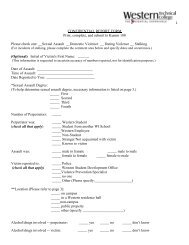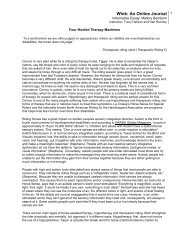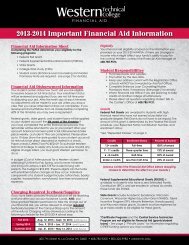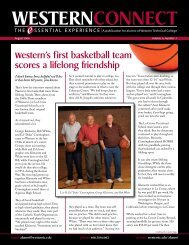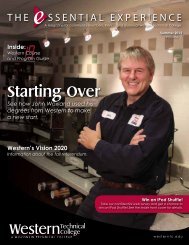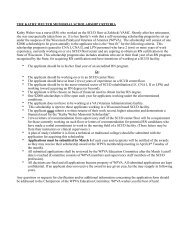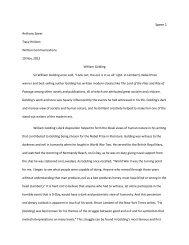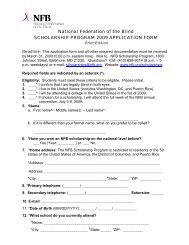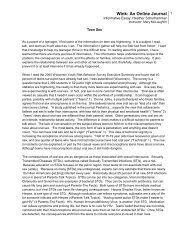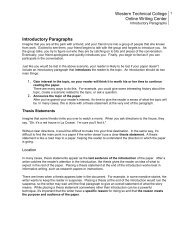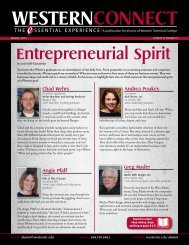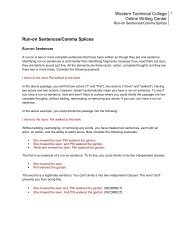The History of Western Technical College
The History of Western Technical College
The History of Western Technical College
You also want an ePaper? Increase the reach of your titles
YUMPU automatically turns print PDFs into web optimized ePapers that Google loves.
In the spring <strong>of</strong> 1928, an apprenticeship banquet was held at the Vocational School. This first apprenticeship banquet was<br />
an outgrowth <strong>of</strong> an awakening to apprenticeship possibilities for the community <strong>of</strong> La Crosse, its industries, and for the<br />
public at large, and was intended to become an annual event. <strong>The</strong> event was a "stag" affair at which local apprentices,<br />
their fathers and employers together with a few special friends <strong>of</strong> apprenticeship sat down to dine together. Walter F.<br />
Simon, supervisor <strong>of</strong> apprenticeship with the Industrial Commission was the principal speaker. He spoke about the<br />
"present day lack <strong>of</strong> skill and craftsmanship in the trades . . . that no civilized people anywhere will tolerate the inefficient<br />
workmanship that is permitted by the American people . . . that expert European tradesmen reached a high degree <strong>of</strong><br />
skill through serving a carefully planned and supervised apprenticeship . . . and since Wisconsin has by statute made<br />
possible a similar method, a number <strong>of</strong> Wisconsin concerns have supplied themselves with skilled tradesmen."<br />
Members <strong>of</strong> the Vocational Commercial Club enjoyed a treat when Mrs. Watkins, a guest speaker, gave an interesting<br />
talk on her experiences about living in China for seven years. "We always think <strong>of</strong> China as a blot upon the map. One has<br />
to really visit the country and mix with its natives to appreciate China at all." Mrs. Watkins described the land, and<br />
provided information about the people and their customs.<br />
Thirteen classes were in session in April, 1928 as visitors viewed the annual Vocational School evening school exhibit. It<br />
was reported that from the time the doors opened in the evening, there was a continual stream <strong>of</strong> people viewing the<br />
work done by the evening school students and watching them at work in the thirteen classes that were in session. <strong>The</strong><br />
most popular <strong>of</strong> the classes were the cabinetmaking, printing, and reed fibre furniture making class, the applied arts<br />
class, the beauty culture class, and the class in machine shop. In addition, rooms were set aside to display items made by<br />
the students.<br />
In May, 1928 in observance <strong>of</strong> "Music Week", students <strong>of</strong> the Vocational School presented Humperdinck's famous opera,<br />
"Hansel and Gretel" in the school's auditorium.<br />
1928 was the most successful year since the start <strong>of</strong> the school . . . with 50 instructors teaching 33 subjects to 2,712<br />
pupils in the evening school classes, and 17 teachers instructing 32 subjects to 171 students in the day school classes.<br />
A survey conducted in November, 1928 indicated that vocational students were employed in sixty-two factories and<br />
trades in La Crosse compared to 52 that <strong>of</strong>fered employment in the spring; 54.1 percent <strong>of</strong> the boys were over 17 years<br />
<strong>of</strong> age; 57.5 percent <strong>of</strong> the girls were over 17 years <strong>of</strong> age, and 55.9 percent <strong>of</strong> the part-time pupils were 17 years <strong>of</strong> age.<br />
"One <strong>of</strong> the most outstanding pieces <strong>of</strong> work <strong>of</strong> the school during 1928," according to Director Coleman, "was the<br />
inauguration <strong>of</strong> the Foremen's Safety school. <strong>The</strong> employers <strong>of</strong> the city, cooperating with the superintendents, foremen<br />
and supervisors, have made possible the giving <strong>of</strong> safety instruction to 432 men and women. This instruction ought to do<br />
much to reduce the number <strong>of</strong> accidents in our local industries." <strong>The</strong> Foremen's Safety School brought its eight-week<br />
course to a successful close with a banquet in the Vocational School auditorium on Saturday evening, December 29, 1928.<br />
Keynote speaker for the evening was Judge John C. "Ikey" Karel <strong>of</strong> Milwaukee, a former Wisconsin football star, who paid<br />
tribute to the foremen for their work that made it possible for La Crosse to have the lowest percentage <strong>of</strong> accidents for a<br />
city <strong>of</strong> its size in the country.<br />
<strong>The</strong> Vocational School Blue and Gold Basketball team rose from a position <strong>of</strong> insignificance to a place that commanded<br />
recognition. <strong>The</strong> quintet included Earl Dansbury, Ervin Limpert, Oswald Wuest, Paul Hefti, and Maurice Shaller. Manager<br />
<strong>of</strong> the team was W. F. Oppermann, a faculty member <strong>of</strong> the school. Lester Wilke and George Gordon, <strong>of</strong> the La Crosse<br />
Normal School (then located between 17 th and 18 th on State Street) volunteered to coach the Vocational Five. <strong>The</strong> team<br />
had five victories and three losses.<br />
In 1929, Evening School enrollment was up to 4,169 and until that year most <strong>of</strong> the students attended school only once a<br />
week.<br />
On January 25, 1929, the Vocational Regulars fought a losing battle in basketball with the La Crosse Tribunes at the<br />
Vocational Gym. <strong>The</strong> Regulars put up a good fight, but in the end it was 15 to 8 for the Tribunes. <strong>The</strong> Alumni played the<br />
Blackhawks, winning 21 to 19.<br />
In 1929, the boys Printing class completed an evening school bulletin giving detailed information about every evening<br />
school class and the locations in which the evening school classes were conducted. <strong>The</strong> school received requests for the<br />
booklet from industrial education heads in Texas, Alabama, Nova Scotia and other distant points.



